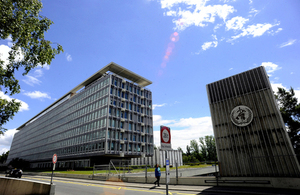World Health Assembly 70: UK on Human Resources in the WHO
The UK statement delivered at the 70th World Health Assembly in Geneva on 26 May 2017.

The World Health Assembly takes place at the Palais des Nations. The World Health Organization is headquartered in Geneva.
WHO is nothing without world-class staff. A staff yes with world-leading scientific and medical expertise. But a staff also that has the skills and confidence to challenge appropriately Member States and partners, to persuade and to influence. A staff with an advanced knowledge of the political, economic and social context. A staff that reflects and represents the modern world and the people we seek to serve.
On this we can all agree.
WHO’s human resources strategy has made some progress. It has a lot to contend with. The need to better manage poor performance – we are glad to see the sharing among staff of the results of disciplinary action. The need to keep staff fresh and keep innovative ideas flowing – we are pleased to see progress towards the mandatory implementation of the mobility policy. The need for staff to be independent and able to challenge – we are glad to see progress on the rosters of WHO Representatives and greater movement of WR’s between regions.
Funding is an issue – that is clear. It is most apparent in HR terms in the insecure, short term contracts that act as a block to recruiting the best staff and inject instability into WHO’s work programmes.
Putting funding aside, as we cast our eye over the wide range of policies being tested on HR – as contained in the annex to the Secretariat’s paper – we agree it is right to test and try new approaches. But, with limited capacity and the well-known challenges of effecting organisational change we also see the need to quickly prioritise what works and roll this out more widely. And conversely, to make clear decisions to pause or cancel policies where evidence indicates they are not having impact – or simply where the capacity does not exist to attempt to implement them satisfactorily.
So our specific question to the Secretariat on which we would appreciate a response today would be this: of the policies and approaches in your annex, which has been the greatest success and which the least?